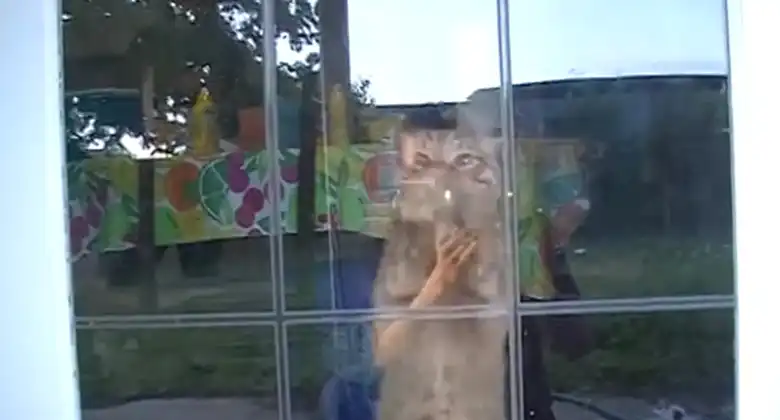Cats are majestic creatures known for their agility, curiosity, and the unmistakable sound of their claws clicking against various surfaces. If you’re a cat owner, you’ve probably wondered at some point, “Can cat claws scratch glass?
In a word: Cat claws are indeed capable of scratching glass surfaces, but the extent of the damage can vary. The reasons behind this phenomenon are as fascinating as they are concerning, making it essential for cat lovers to understand the dynamics at play.
Curious to know why cat claws pose a potential threat to your glass possessions and how to prevent it? Stick around as we embark on an exploration into the world of cat claws and glass surfaces. We’ll explore the influencing factors, and provide you with practical solutions to keep your glass scratch-free. Get ready for some ‘pawsitively’ enlightening insights on this furry feline mystery!

What is the Science Behind Cat Claws?
Before we determine whether cat claws can scratch glass, it’s essential to understand the composition and structure of feline claws. Cat claws are retractable, which allows cats to keep them sharp and ready for action. The outer layer of a cat’s claws is made of a hard protein called keratin, the same material found in human nails.
While a cat’s claws are formidable tools for various tasks, such as climbing and self-defense, they are not as rigid as you might think. When a cat extends its claws, they are sharp and pointed, but when they’re retracted, they are relatively dull and pose less risk of causing damage.
Can Cat Claws Scratch Glass?
The million-dollar question: can cat claws scratch glass? The answer is both yes and no, and it depends on several factors:
1. Type of Glass
- Regular Glass: Ordinary window glass, like the one you find in most homes, is relatively resistant to cat scratches. Cat claws are unlikely to leave visible marks on it, especially when the glass is clean and well-maintained.
- Tempered Glass: Tempered glass, often used in shower doors and some furniture, is more scratch-resistant due to its increased hardness and durability. Cat claws are less likely to scratch tempered glass.
- Decorative Glass: Delicate and decorative glass surfaces, like stained glass windows or glass artwork, are more vulnerable to scratches. In such cases, it’s best to keep cats away to preserve these intricate pieces.
2. Condition of the Claws
- Trimmed Claws: Cats with regularly trimmed claws are less likely to scratch glass. Keeping your cat’s claws well-maintained is essential to reduce the potential for damage.
- Overgrown Claws: Cats with long, overgrown claws are more likely to leave marks on glass surfaces, as the extended, pointed claws can exert more pressure.
3. Cat’s Behavior
- Curiosity and Playfulness: Cats may paw or scratch at glass surfaces out of curiosity or playfulness. While this behavior is unlikely to cause significant damage, it can leave minor marks or smudges.
- Aggression or Fear: If a cat feels threatened or aggressive, they may scratch surfaces as a defensive gesture. In such situations, scratches may be more pronounced.
Preventing Cat Claw Damage to Glass
To prevent cat claw damage to glass surfaces, consider the following measures:
- Regular Claw Trimming: Keep your cat’s claws trimmed to reduce their sharpness and prevent potential damage.
- Use Scratching Posts: Provide your cat with suitable scratching posts or pads to redirect their scratching instincts.
- Window Protection: If your cat loves to perch on windowsills, use transparent plastic or acrylic sheets to cover the glass, providing a barrier between the cat and the glass surface.
- Distract with Toys: Offer engaging toys and interactive play to keep your cat’s attention away from glass surfaces.
- Tempered Glass: If you’re renovating or replacing glass surfaces, consider using tempered glass, which is more scratch-resistant.
- Consult a Veterinarian: If your cat’s scratching behavior is excessive or linked to stress, consult a veterinarian for guidance.
Conclusion
In the grand scheme of things, cat claws can indeed scratch glass, but the extent of damage depends on various factors, including the type of glass, the condition of the cat’s claws, and the cat’s behavior. While minor marks or smudges are possible, the risk of severe damage to typical window glass is relatively low. As a responsible cat owner, it’s crucial to maintain your cat’s claws and create an environment that discourages scratching on valuable glass surfaces. By taking these precautions, you can enjoy the beauty of glass in your home while cherishing the presence of your feline friend.
If you have more questions about cat behavior or any other feline-related queries, feel free to leave a comment below. Thanks for reading, and may your glass surfaces remain scratch-free!
FAQs
Q: Can Tempered Glass Be Scratched By Cat Claws?
A: While tempered glass is more resistant to scratching, it is not entirely scratch-proof. Sharp cat claws, if used with enough force, can still leave superficial scratches.
Q: Will Using Claw Caps Harm My Cat?
A: No, claw caps are safe for cats when applied correctly. They prevent damage to surfaces while allowing your cat to retract and extend their claws naturally.
Q: Are There Specific Glass Surfaces That Are Less Prone To Cat Claw Scratches?
A: Yes, glass with a higher hardness rating, such as tempered glass, is less susceptible to cat claw scratches compared to standard window glass.
Q: Can Cat Claw Scratches Be Repaired On Glass?
A: Minor cat claw scratches on glass surfaces can often be buffed out or minimized with glass polishing kits. Deeper scratches may require professional glass repair.
Q: Do All Cats Have The Same Potential To Scratch Glass?
A: Cat claw strength and scratching tendencies can vary among individual cats. Some cats may scratch glass more often or with more force than others.
